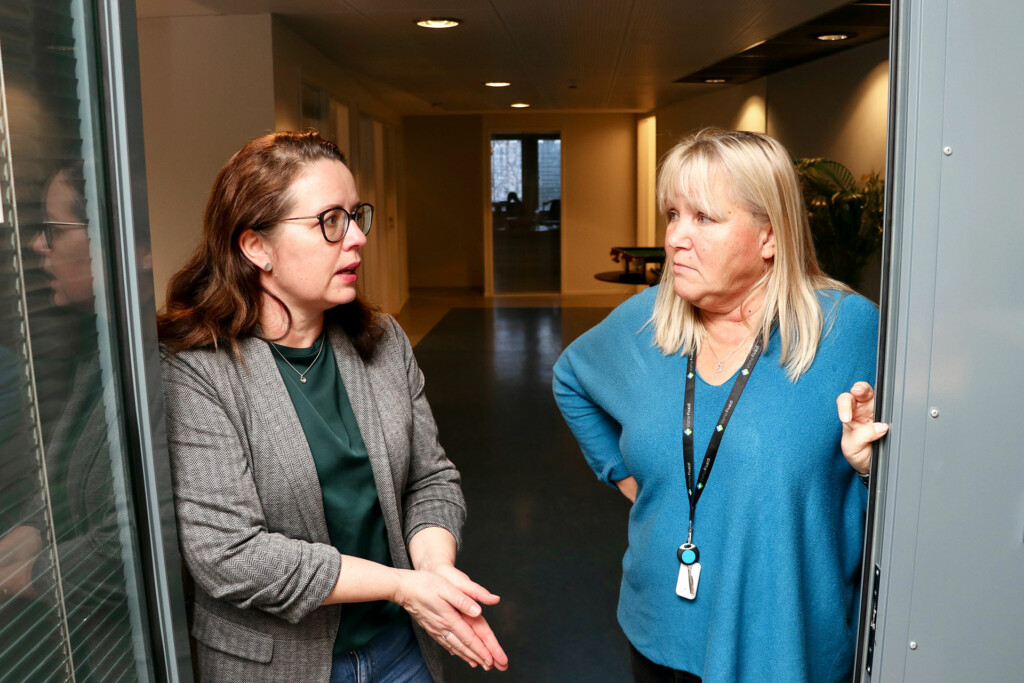You can read the article in Finnish: Suomen kieli karttuu vauhdilla työn ohessa
According to a survey by the Helsinki Region Chamber of Commerce which was conducted in the autumn, more than a quarter of companies have not considered recruiting or hiring international talent. The main reason for this is the requirement for a native level of Finnish or Swedish.
However, Johanna Larsson, Project Manager and Expert on International Labour at the Helsinki Region Chamber of Commerce, points out that many jobs can be started even with limited language skills. More and more companies are solving language-related challenges by offering their employees with an immigrant background the opportunity to learn Finnish alongside their work.
“There are many employers that provide language training and give their employees the opportunity to study the language during working hours. They can, for example, reserve a couple of hours for joint training on a regular basis,” says Larsson.

Immigrants have solved the skills shortage
One company that has invested extensively in supporting its employees to learn Finnish is Taloustaivas, an accounting firm in Espoo, where six of the 12 employees have an immigrant background.
Anneli Rosenberg, who founded the company in 2018, says that using international talent has been essential from the start.
“We initially looked for financial administration professionals through the TE Office but did not receive any decent applications. Therefore, we decided to look for people with the right attitude through other means and train them for the job ourselves,” says Rosenberg.
The company started to find new employees among immigrants studying financial administration, whose studies include a few months of compulsory practical training.
The first trainee at Taloustaivas was Zahra Alijani, who is of Afghan origin. She admits that the beginning of her career was challenging.
Alijani had mastered the basics of bookkeeping and calculation of salaries through her studies which were taught in Finnish, but when it came to practice, the language presented her with challenges. Gradually, however, her language skills improved.
“My Finnish-speaking colleagues were a great help, and I was constantly learning new things.”
In three years, Alijani’s professional expertise and language skills have developed to such an extent that she has become an Accounting Team Lead. She has also recently been invited to become a partner at Taloustaivas.

Finnish remains the working language of the accounting firm
Taloustaivas decided from the start that Finnish would remain the working language of new employees, despite their limited language skills. The language choice was substantially influenced by the fact that a good command of Finnish is essential for using the accounting vocabulary and software.
In addition, the clients expect Finnish-language service.
“We always speak Finnish with each other in the office. The language choice also helps immigrants to integrate and progress in their careers in Finland. We encourage our employees to learn Finnish. They also have the possibility of devoting part of their working time to it,” says Rosenberg.
Zahra Alijani says that the best way to improve Finnish language skills is to work with Finns.
“I have a good command of the jargon, but I still need to improve my language skills in areas such as leisure and hobbies.”
Good tips from the Chamber of Commerce
Taloustaivas has not received any public funding for practical training for immigrants. The company has also missed the opportunity to receive support for language training.
“It was only through the Chamber of Commerce that we found out that such an opportunity existed. It is generally difficult to get information about matters relating to the employment of immigrants when all services are scattered and in separate places,” says Rosenberg.
According to Johanna Larsson of the Chamber of Commerce, many other companies lack information about the available public services.
“At the Chamber of Commerce, we are happy to provide advice to companies on these issues and to pass on information about the available public services and support.”
Larsson’s job at the Chamber of Commerce is to support companies in international recruitment and to help international talent to find employment.
“Financial support for language training for employees with a foreign background is available from the TE Office and the ELY Centre’s Workplace Finnish service, Larsson says.
Companies can choose their preferred service provider from the Workplace Finnish contract partners, with whom the training can be tailored to the company’s needs. The training can focus on, for example, professional vocabulary or customer service situations at work. Depending on the size of the company and the type of training, the company’s share of the cost of the language training will be between 30% and 50%.
Larsson points out that the Language boost website also offers useful materials for studying Finnish or Swedish. The service, which is run by higher education institutions, provides self-study materials and tips for learning the language at work.
Studying Finnish promotes integration
One company that has made use of the support provided by Workplace Finnish is Eaton Electric Oy, a Vantaa-based manufacturer of uninterruptible power supply (UPS) devices and energy reserves. Eaton completed a new production plant in Tuupakka last autumn, and the increase in production has required dozens of new recruitments.
Eaton’s Senior HR Business Partner Riikka Fagerström says that the majority of the new employees have an immigrant background.
“As a responsible employer, we want to offer our employees the possibility to learn Finnish, even if it is not necessarily needed for the job.”
As a rule, the working language in the international Eaton Group is English, but Finnish is also used in Finland, especially in production tasks.
“Finnish language skills are not necessary in many specialist tasks.
However, Finnish is required if a person is working in production or collaborates extensively with production teams,” says Fagerström.
A suitable language trainer was found quickly
According to Fagerström, finding a language training provider did not take long. A suitable partner was soon found in the Workplace Finnish service’s contract trainer register.
At Eaton, language training focuses on everyday communication situations at work and in free time as the employees already have a good command of the professional vocabulary in Finnish and English.
Participation in language courses at Eaton is voluntary, and studying is based on each employee’s own initiative. Training sessions are typically held once a week for a couple of hours at a time during working hours. Face-to-face training is complemented by online training.
“In this way, we want to support the integration of employees with an immigrant background into Finnish working life and society. They are not just working in Finland, but knowing Finnish also helps them in their free time,” says Fagerström.
Johanna Larsson says that many other companies where English is the working language also encourage their employees to improve their Finnish language skills.
“Learning Finnish increases the employees’ commitment to the company and builds team spirit by allowing everyone to take part in coffee-table discussions.”
Lidl invests in thorough induction
Language issues have also been closely considered at Lidl, which, like other retailers, has a large number of employees with an immigrant background, especially for carrying out in-store and logistics tasks. Lidl’s District Manager Henrikki Harjula says that, in the Metropolitan Area, most of them come to the company through open job searches.
“In Finland, Lidl’s official working language is Finnish, but employees can also get a good start with English.
In warehouse work in logistics, employees have long managed with English, but a similar change is also taking place in the stores,” says Harjula.
In Lidl stores, new employees go through a one-month induction period.
It is divided into self-directed online training and instructor-led induction.
“The training materials are still mostly in Finnish, but the instructor can provide support to go through them, if needed,” says Harjula.

Language skills improve quickly while working
The induction covers the issues required by legislation, such as occupational safety and self-monitoring. The initial phase also includes cash desk and shelving training.
According to Harjula, new employees learn the vocabulary used in the retail sector, such as product categories and the most common products. As part of the induction to cash desk work, they also learn sums and terminology related to money handling.
“Learning the terms is very important for all new employees. Special attention should be paid to this if an employee has not yet fully learned the Finnish language,” says Harjula.
In customer service situations, Lidl store employees are expected to master a basic level of Finnish.
“We encourage our employees to speak Finnish with their colleagues and customers as language skills are most effectively acquired at work and in everyday situations.”
According to Harjula’s observations, new employees usually develop their language skills quickly.
“There are certain things that customers often ask. The same terms are also repeated often at the cash desk, and they are quickly learned.”
Once the basics are fully mastered, the training of the new employees continues, for example, in the in-store bakery and the fruit and vegetable department. At this stage, employees also complete a hygiene passport.
“As the employees’ careers progress, they will also have the opportunity to apply for a training programme for shop managers. Many employees with an immigrant background have progressed to become shop managers,” says Harjula.
Great trainees from Business College
In the Helsinki Metropolitan Area, Lidl cooperates with Business College Helsinki to employ students with an immigrant background.
“We have visited the institution to present job opportunities at Lidl and offered students the opportunity to apply for practical training. Many of those who have come through the training have stayed to work with us,” says Harjula.
He says that the company has many positive experiences with employees of immigrant origin.
“They are highly motivated to work in Finland. It shows in their work and their willingness to learn Finnish. They are committed to doing their job as well as possible, including already during the practical training period.”
Colleagues helped in learning the language
Taloustaivas has found students with an immigrant background for practical training at, for example, Omnia and Business College. One of them is Yen Tran from Vietnam. She applied for a traineeship at Taloustaivas although her Finnish language skills still needed improvement.

“At first, everyone suspected that Yen’s language skills were not sufficient. But she was such a great person that she had to be hired. Yen has since proved that the recruitment paid off. She has the right attitude and a strong desire to learn,” says Anneli Rosenberg.
Yen Tran says that, during her traineeship, the other employees were very helpful in providing guidance and assistance whenever she had questions. As a permanent employee, her responsibilities include accounting and the calculation of salaries for client companies.
“My language skills are developing gradually as I have to speak with other employees in Finnish and not in any other language. The accounting software and documents are in Finnish. And the most important thing is to communicate in Finnish with the clients,” Yen Tran emphasises.
Not necessary to change the working language
The experience of Yen Tran is that it is not as difficult for a foreigner to integrate into Finnish working life as it is perhaps often thought.
“At first, it can be difficult to understand everything people say. However, we talk a lot during meals and coffee breaks to improve our ability to speak and understand Finnish.”
Online translation software is also useful at work. Yen Tran can use it, for example, to check that the grammatical case in an email to a client is correct.

Anneli Rosenberg encourages hiring immigrants, even though induction and training may take more time than for native Finns and thereby increase costs.
“In the long run, the investment will pay off. I recommend this especially for sectors suffering from a labour shortage,” Rosenberg says.
She has noticed that many companies are afraid of changing their working language if they hire international talent.
“It is not necessary to change the language. If you speak Finnish to immigrants, they will learn it.”





















